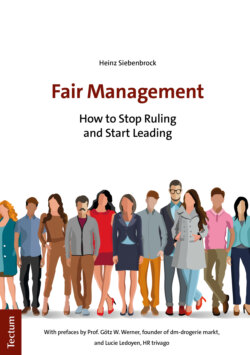Читать книгу Fair Management - Heinz Siebenbrock - Страница 9
На сайте Литреса книга снята с продажи.
ОглавлениеPreface
Economics has been the subject of criticism for some time, although this criticism is primarily directed at economics theory. Walter Otto Ötsch (Mythos Markt [The Myth of the Market]), Thomas Piketty (Capital in the Twenty-First Century), Peter and Andrew Schiff (How an Economy Grows and Why It Crashes), Joseph Stiglitz (People, Power, and Profits: Progressive Capitalism for an Age of Discontent) and others trace back global and national economic problems to an inadequate theoretical structure. Regarding the 2008 financial crisis, David Orrell even concludes: ‘I criticise the mathematical models that the economists use, not because they didn’t predict the crisis… I criticise them for having made the crisis possible in the first place. They created a false sense of security, like putting on a seat belt that isn’t anchored to anything.’1
This book is not primarily about calling into question the foundations of economic theory and the theory of business, which is closely related to it. Rather, it aims to draw attention to the hazardous yet mostly unheeded side effects of the theory of business. The extremely questionable conceptions of value which the theory of business is implicitly founded on are the starting point of these considerations.
In my opinion, alongside the proper amount of theory, business studies also conveys values which must have a considerable influence on current and future managers, even if (or maybe because) this occurs subliminally. Conveying these dubious yet rarely questioned values encourages the conditions within the economy that the public quite rightly lament. The results are exploited resources, greedy executives, avaricious consumers, demotivated workers, burnout and even death!
The questionable values of business studies contribute to reducing the people within a company to a factor of production to be controlled just like the machines. From this derives the widespread paradigm of the manager who has to have everything under control and keep it that way. This book contrasts this approach of ruling with a model of management that puts the focus on the initiative of the employees. In this sense, leading means creating a framework in which employees have the desire to be successful by themselves and will do whatever it takes to remain successful. This ‘Guide to fair management’ serves as a basis for this, which I present to you as an alternative framework for management.
***
Why should you read this book?
1 This book discusses serious weak points in the traditional teaching of business studies. In particular, its implicit basic assumptions are systematically exposed and taken as an opportunity to counter the subliminal brutalisation of business and society.
2 This book is conceived as a structured guide for current and future managers. In this book you will find a theoretical structure that you can use to develop your own ethically based style of management.
3 The advice and case studies in the book show you how to strengthen your managing on an ethical basis.
4 The book will help you to reclassify common management concepts such as quality management, knowledge management and agility according to an ethical basis.
Drensteinfurt, October 2020 Heinz Siebenbrock
